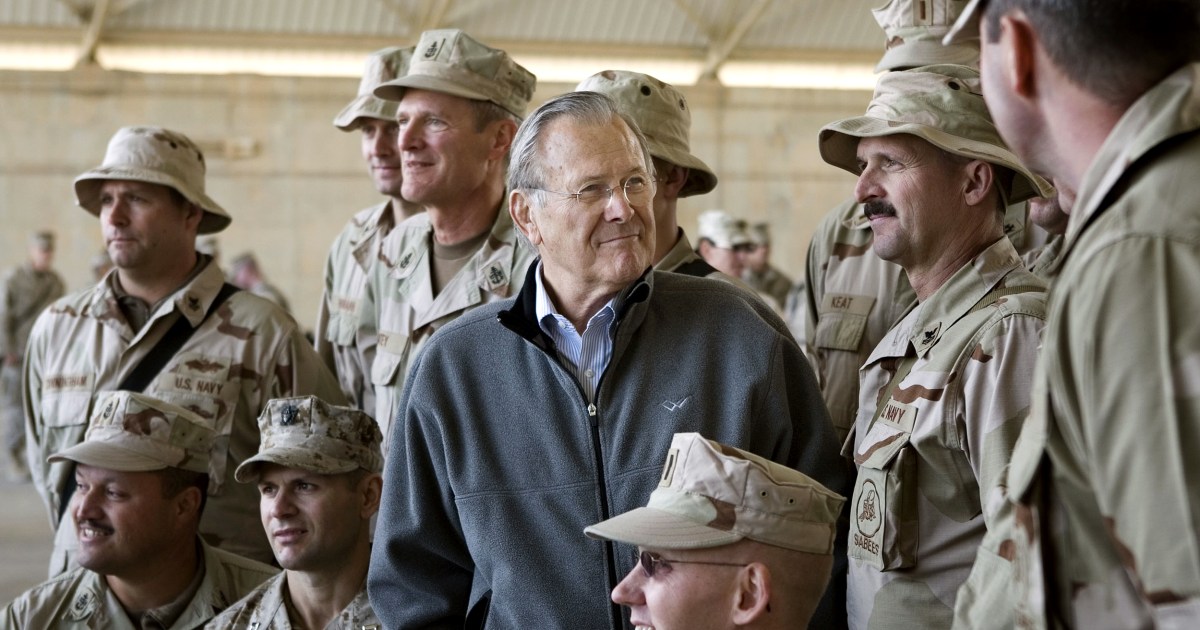
As is often the case with deaths of political figures, the memories of their injustices are quickly whitewashed in the name of mourning the deceased and respecting the grieving families. Former Secretary of Defense Donald Rumsfeld, who died Tuesday at the age of 88, has been no exception. The true tragedy of his passing is that he never faced justice.
President George W. Bush, Vice President Dick Cheney and other architects of the devastating and unproductive wars that followed 9/11 must be held to account.
Following his death, many obituaries have instead sung his praises. His former colleague Condoleezza Rice referred to her “good friend” as a “remarkable and committed public servant.” Similarly, Senate Minority Leader Mitch McConnell, R-Ky., called Rumsfeld one of the nation’s “fiercest defenders.”
The lives we should be grieving, however, are those of the hundreds of thousands of innocent Iraqis and Afghans who died as a consequence of the push for war that Rumsfeld, aided by many fellow officials in President George W. Bush’s administration, made following Al Qaeda’s attacks on Sept. 11, 2001. As an Iraqi, these deaths, several of them friends and family members, continue to haunt me. Without Rumsfeld’s war, many of them would still be with us.
Rumsfeld’s relationship with Iraq began as President Ronald Reagan’s Middle East envoy, famously beaming as he shook then-Iraqi leader Saddam Hussein’s hand. On behalf of the United States, he vowed to support the dictator in stymieing Iran while overlooking human rights abuses. Years later, Rumsfeld turned his back on this partnership as he became one of the main architects of both the Iraq and Afghanistan wars.
Within six hours of the twin towers attacks, Rumsfeld set his sights on Iraq.Rumsfeld’s orders that day were described in notes as telling his aide to get the “best info fast” and then “judge whether good enough hit S.H. [Saddam Hussein] at same time. Not only U.B.L. [Osama bin Laden].” Then, “Go massive. Sweep it all up. Things related and not.”
Without sufficient public support, however, the Bush administration wouldn’t have been able to get congressional approval for an attack on Iraq. Rumsfeld, beloved by many in the media at the time for his belligerent grin and assertive authority, began making the case for an Iraq invasion.
In September 2002, Rumsfeld announced the U.S. had “bulletproof” evidence that a Saddam Hussein and Al Qaeda alliance existed. It didn’t. We are also now all aware Iraq didn’t possess weapons of mass destruction. Rumsfeld, in contrast, not only claimed they did exist, but declared he even knew their location.
When Baghdad fell to U.S. troops, the United States protected the Ministry of Oil while widespread looting of Iraq’s national treasures took place. When probed about this looting, Rumsfeld’s response highlighted his lack of empathy: “Stuff happens.”
To this day, Iraqis are suffering from the costs of the war. It’s estimated that some 200,000 Iraqi civilians have died as a consequence of the Iraq invasion, with their families yet to see justice. My own extended family is now dispersed around the globe, from the U.S. to Australia, as part of 9.2 million Iraqis displaced internally or abroad, with the number still growing.
After my grandfather’s house in Baghdad was damaged by an explosion, the constant fear led to many family members fleeing the country. I myself witnessed a horrifying car bomb in Baghdad, killing scores of civilians, on a visit to Iraq.
Rumsfeld was also one of the main engineers behind the U.S. government’s global torture programs, euphemistically dubbed “enhanced interrogation techniques.” This is a man who once complained that forcing prisoners to stand for four hours should be more like “8-10 hours.”
History will remember Rumsfeld for the destruction he caused and the lives he ruined. It is a shame justice was never served while he lived. Before it’s too late, Bush, former Vice President Dick Cheney and other architects of the devastating and unproductive wars that followed 9/11 must be held to account rather than allowed to peacefully see out their remaining years, a privilege not afforded to many Iraqis.
Source: | This article originally belongs to Nbcnews.com










